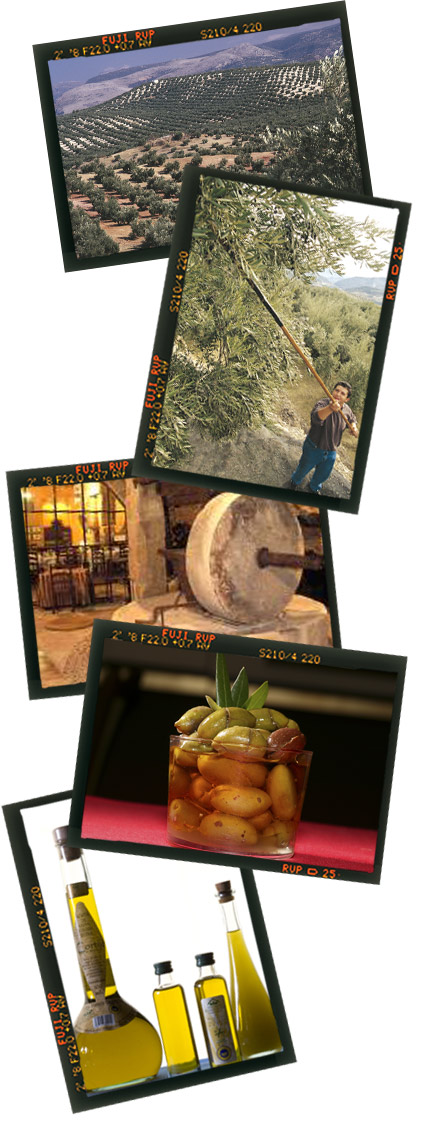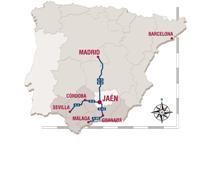Monographics - The olive tree culture
The olive tree
culture
There is a whole
interesting world
around Jaén's olive trees
Olive oil is a gastronomic treasure connected with the reality and identity of Jaen’s people. Its importance is not only due to economical matters but also for the great culture and history related to the olive tree. So, we can talk about the olive tree culture, whose hallmarks are the landscapes, the typical “cortijos” farmhouses, oil mills, popular festivals, olive oil museums, specialized shops, archaeological sites, local gastronomy, and more, in conclusion, the kind of features that define the Mediterranean Countries.
Jaen’s province is the largest producer of olive oil in the world; the city offers a wide variety of activities of “oleotourism”, tourist activities related to the oil culture: museums, “cortijos”, oil mills, trade fairs, etc. The city offers many attractions, but there are special places and infrastructures that you cannot miss. The olive tree is a species of tree originally from the Eastern Mediterranean (Asia Minor); this is the place where it was first cultivated, but the high prices of the production permitted the expansion of production across the Mediterranean regions. As the typical Mediterranean tree, the olive tree is well adapted to the rough environmental conditions such as the droughts and high temperatures. The olive tree needs well-ventilated poor soils. It usually blooms at the end of spring time (April-May), its fruits are the olives, and they develop during the summer period and ripen at the beginning of autumn (September-October). They change their colour and keep on ripening until the first months of winter. The first records of the olive tree are some Mycenaean engravings made in hardened mud, the engravings date from the reign of king Minos (2.500 years B.C). They bear testimony to the importance of the olive oil in the Cretan economy. Some measures to preserve the olive groves were reflected in Greek legislation, to increase their production and also punitive measures for those who try to pull them off. Later, the Romans were great consumers of the olives and the oil coming from Hispania, more specifically from the Bética (current Andalusia). From ancient times, the olive tree was considered in the Mediterranean as a symbol of peace and friendship and was also thought to have curative and religious virtues.
Mediterranean gastronomy has bread, wine and olive oil as its three fundamental pillars. They play an important role in Mediterranean diet but they do not have the same importance. The Mediterranean culture conferred the bread to some mystical connotations, the bread invites us to sit and have an exquisite meal, and wine entertains the diners being “the intellectual element” of the meal. Olive oil has a spiritual meaning of the dinner, it is the element that keeps the diners sitting at the table, because it is able to integrate and enhance the elements of the different flavours. A good wine is able to remedy the taste of a bad meal, but the use of bad oil can ruin the flavour of the meal without remedy.
In short, using olive oil as a main ingredient improves the delicious taste of any kind of dish. Jaén is the world city of olive oil, but we can find excellent wines and breads in the province too. The importance of the olive oil as a key ingredient of local gastronomy is reflected in the great variety of dishes which all begin by pouring oil in the frying pan, for instance to prepare fish, meat, vegetables or pastry dough. Also in typical dishes like pipirrana, adding a dash of extra virgin olive oil as the perfect final touch gives a particular fruity taste and a scent of freshly cut grass to the dish. The Picual variety is the most common of Jaen olives; the oil made by this olive is bitter and even spicy, so it’s perfect to prepare cod fish cooked al pil-pil, vegetable stir-frys, meat stews, pickles, game meat or fish and is essential in garlic dishes.
OLIVE OIL HEALTH BENEFITS
(Jaen’s Declaration, signed by more than 300 health specialist in the International Congress of Olive oil and Health, held in Madrid on 21-23 October of 2004). In developed countries there is a growing concern about population ageing due to the increase of the pathologies such as arteriosclerosis, Parkinsons, Alzheimers, vascular dementia, cognitive impairment, diabetes and cancer. Epidemiological studies indicate that a Mediterranean diet rich in virgin olive oil lowers cardiovascular risk. A Mediterranean diet improves control of the cardiovascular risk factor, including lipid profile, blood pressure, glucose metabolism and antithrombotic profile. This diet positively influences the endothelial function, the inflammation and oxidative stress. These effects are attributed to the minor components of the olive oil, so it is important to include it in our Mediterranean diet. Several observational studies carried out in human beings have proven that monounsaturated fat protects us from cognitive impairment related with ageing and Alzheimers. It has been proven that the minor components of virgin olive oil are bio-available in human beings; they have an antioxidant capacity and influence positively on the arterial function and haemostasis due to its antithrombotic properties. Countries that enjoy the Mediterranean diet and those that have olive oil as their main source of fats, like Spain, Greece and Italy, have a lower rate of cancer than the countries of northern Europe. The protective effect of olive oil is supposed to be greatest in the early years of life, so it is recommended to consume it before puberty and keep this consumption up throughout life. Latest studies show that the Mediterranean diet based on olive oil consumption leads to healthy ageing and increases longevity. However, despite the significant advances of recent years, further research is required to know the specific mechanism involved in those effects, and the significance of the other components of olive oil and their benefits.
We do not know precisely when olive-growing started in Spain, but the most widely accepted thesis points out that the Greeks and the Phoenicians were the pioneers; however, its cultivation gained importance from the arrival of Scipio in 211 B.C. During Roman times, the trade with the oil from Hispania spread throughout western Roman dominions. This is evidenced by the abundance of remains, for example the conserved parts of the amphoras from the province of Old Baetica, they were used to carry the oil along the great Europeans rivers: Rhone, Garonne, Rhine and Upper Danube. Nevertheless, most of the trade of Andalusia´s oil was under the control of the Roman population. Mount Testaccio in Rome, that can still be visited today, is made up of the remains of the Andalusian amphoras; we can recognize them by their origin markings. The oil was supplied to the capital city of the empire by these amphoras. This flourishing oil trade led to the expansion of olive tree cultivation throughout the entire Betís Valley (Guadalquivir valley, nowadays), extending to the hills of Sierra Morena. The oil mills were placed at the heart of the olive tree forests and the industry of amphoras was placed along the river banks (Especially in Genil and Guadalquivir rivers). In the Visigoth period we can observe important advances in olive cultivation; while Arab documentary sources show the richness of olive groves in the Guadalquivir Valley. Alonso de Herrera in “General agriculture” gives great importance to olive-growing; he argues that this activity occupied a vast extension of Andalusia’s countryside in the first half of the 16th century. We can find remains of these olive trees spreading all over the province. The presence of old olive trees, as part of scattered, irregular groups, or even isolated, reminds us of the big old plantations. The construction of the railway network in the 19th century helped the spread of olive-growing in inland areas, shaping the olive tree map in Spain. Nowadays, olive-growing is undergoing rapid expansion due to the intensive irrigated plantations, in which advanced olive-growing techniques are applied.

















